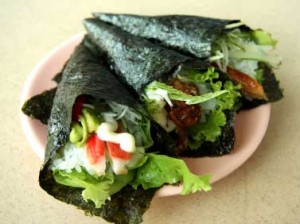 Increasingly, my patients have become more and more interested in trying to improve their health using natural foods and supplements. Lately, several of them have asked me about seaweed – the centuries old staple of Chinese, Korean and Japanese cultures revered for its many health benefits. As I tell my patients, seaweed – a sea vegetable – has many outstanding nutritional benefits that are worth taking advantage of. Here’s what you should know about seaweed.
Increasingly, my patients have become more and more interested in trying to improve their health using natural foods and supplements. Lately, several of them have asked me about seaweed – the centuries old staple of Chinese, Korean and Japanese cultures revered for its many health benefits. As I tell my patients, seaweed – a sea vegetable – has many outstanding nutritional benefits that are worth taking advantage of. Here’s what you should know about seaweed.
Seaweed – A Legendary Nutritional Powerhouse
If you’ve ever eaten sushi – a traditional Japanese food – you may know that the edible wrapper that surrounds the fish, called nori, is made from dried seaweed. Their slightly salty taste also makes nori good snacks in place of potato chips. Or, if you’ve ever eaten miso soup – another traditional Japanese food – you’ve eaten ground-dried seaweed along with the soy it contains. A traditional Japanese dessert – agar-agar – a kind of cross between jello and lemon meringue pie – also contains seaweed. All of these foods have a high vitamin and mineral content which Asian people eat daily and to which they attest their good health and longevity.
In fact, the Japanese people credit miso soup with the survival of an entire group of people hospitalized after the nuclear bombing of Hiroshima at the end of WWII. Not surprising, as seaweed contains alginic acid which is able to bind with dangerous heavy metals (mercury, lead, barium, cadmium, and radioactive strontium) to make them indigestible and remove them from your body through elimination.
Other forms of seaweed-based “sea vegetables” that you can find at health food markets that carry organic vegetables, or Asian supermarkets, include:
- Arame – high in calcium, potassium, iodine, vitamins A and B, with a mild, slightly salty flavor that does well in dishes calling for vegetables.
- Dulse – contains 4 times more iron than spinach, high in Vitamin C, potassium.
- Eklonia cava – a type of red and brown seaweed extract. Antioxidant properties 100 times more powerful than blueberries, pomegranates, or green tea catechins with an ORAC value of 8,500! Aids in production of nitric oxide that keeps arteries relaxed and open. Aids in blood flow to the brain, heart, and extremities. Available as a supplement under various brand names.
- Hiziki – contains 10 times the amount of calcium than a glass of milk.
- Kelp/brown seaweed/Wakame – recent research notes that the active chemical in brown seaweed, fucoxanthin, can be a useful weight loss aid. In particular, it seems to target abdominal fat and has been research proven to decrease it. According to Asian medicine, brown kelp also has cancer-fighting properties. A version of wakame, called phytessence wakame, has been eaten by Japanese women for years who credit their flawless skin to it. Indeed, it contains hyaluronic acid, an important compound found in youthful skin.
Sea vegetables are usually sold in their dried form and can be reconstituted by placing in water. You can also crumble and use in salads or other vegetables. Powdered seaweed can also be taken as a supplement as well which is available in health food stores and more comprehensive vitamin outlets.
The Many Health Benefits of Seaweed
As I mentioned earlier, seaweed has long been used in Asian medicine, particularly Traditional Chinese Medicine, or TCM, which categorizes seaweed as having a salty and cold temperament. Formulas containing seaweed are used to treat conditions like upper respiratory congestion, and dissolving nodules and cysts. It is also thought beneficial in:
- Cancer
- Heart disease
- Common cold
- Bone conditions like osteoporosis
- Detoxing the body – cleanses intestines, removes heavy metals, environmental toxins
- Boosts thyroid health (contains high amounts of iodine)
- Regulates cholesterol and blood sugar (from high fiber content)
- Supports brain, heart and vascular health – brown and red seaweed extracts (see Eklonia cava above). Improves memory, erectile dysfunction, and sleep.
As I recommend to my patients, seaweed is a nutritional superfood that has many health-boosting properties. In Okinawa, Japan, there is a mountain town called Longevity Island that has the lowest rates of diabetes, heart disease, cancer and stroke in the world. Obesity is not an issue there. In fact, 40,000 Japanese people are over age 100! The Japanese attribute their good health and longevity, at least partially, to a diet rich in seaweed and its amazing health benefits.
As a doctor who promotes preventative measures in maintaining health, I feel that seaweed can play an important part in keeping you healthy well into your old age.
Stay Well,
Mark Rosenberg, M.D.
Brown Seaweed Contains Promising Fat Reducer, http://www.sciencedaily.com/releases/2006/09/060915204728.htm
Whole Food Supplements, http://www.whole-food-supplements-guide.com/seaweed-health-benefits.html
Okinawan Longevity, http://www.squidoo.com/Okinawan_Longevity
